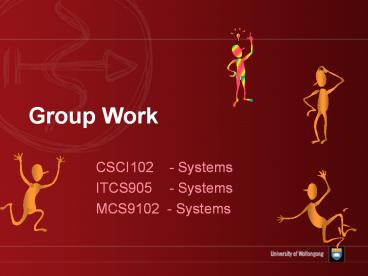Group Work - PowerPoint PPT Presentation
1 / 18
Title:
Group Work
Description:
Mourning. 4. Forming What Does the Group Need. Clear goals ... Mourning. You and/or other group members may: Feel elated at the successful attainment of goals ... – PowerPoint PPT presentation
Number of Views:37
Avg rating:3.0/5.0
Title: Group Work
1
Group Work
- CSCI102 - Systems
- ITCS905 - Systems
- MCS9102 - Systems
2
Overview
- Group development
- Group roles
- Effective groups
- Report components
3
Group Development
- Groups generally pass through the following
stages - Forming
- Storming
- Norming
- Performing
- Mourning
4
Forming What Does the Group Need
- Clear goals and objectives
- Definition of tasks and roles
- Clear work plans
- To know what information is required
- An identification of group behaviour, standards
and norms and ways to handle behaviour problems
5
Forming Group Members Feelings
- Demonstrate excitement
- Participate hesitantly
- Show tentative attachment to the group
- Intellectualise
- Discuss symptoms or problems peripheral to the
task - Be suspicious, fearful and/or anxious about the
new situation - Accomplish minimal work
6
Storming
- You may find that you and/or other group members
exhibit - Infighting
- Doubts about success
- Low group morale
- Polarisation of group members
- Concern about excessive work
- Disunity, increased tension and jealousy
7
Storming
- You and/or other group members may
- Set unrealistic goals
- Resist the task demands
- Establish a pecking order
- Criticise group leaders or other group members
- Complain
8
Norming What Are the Rules of the Group?
- You and/or other group members may
- Attempt to achieve maximum harmony by avoiding
conflict - Develop a high level of trust
- Confide in each other, share personal problems
and discuss group dynamics - Express emotions constructively
- Form friendships
- Develop a sense of team cohesion with a common
spirit and goal - Have high group morale
- Establish and maintain group boundaries
- Accomplish a moderate amount of work
9
Performing
- You and/or other group members may
- Experience insight
- Be willing to sort through group problems
- Understand members strengths and weaknesses
- Confide in each other, share personal problems
and discuss group dynamics - Undertake constructive self change
- Identify closely with the group
10
Mourning
- You and/or other group members may
- Feel elated at the successful attainment of goals
- Feel disappointed at unattained goals
- Feel a sense of loss when the group is disbanded
- Feel relief at the end of the process
- Congratulate each other
- Celebrate
11
Roles in the Group
- Individuals within a team all have unique skills
and strengths - An effective team does well because of the
combined input of ALL its members - Any individual team member can play a number of
different roles within the team
12
Roles in the Group
- Roles are predetermined behaviours expected of
people in a group - Some roles will feel natural - "I'm always the
one who . . . " there will be other roles,
however, which may be difficult, eg chairperson
or presenter. Try and develop as many unfamiliar
roles as possible
13
Roles in the Group
- There are four main types of roles
- Task roles
- Functional roles
- Maintenance roles and
- Dysfunctional roles
14
Task Roles
- Some of the tasks you may need to do include
- Obtaining photographs
- Preparing notes
- Doing calculations
- Evaluating data
- Obtaining references
- Preparing presentations
15
Functional roles
- You may find yourself taking on such roles as
- Coordinator
- Initiator
- Information seeker
- Information giver
- Opinion seeker
- Opinion giver
- Goal setter
- Deadline setter
- Progress monitor
- Evaluator
- Clarifier
- Summariser
- Decision pusher
- Planner
- Spokesperson
- Trouble-shooter
- Diagnoser
16
Maintenance roles
- You may find that your personal skills lend
themselves to one or more of the following
maintenance roles - Encourager
- Gatekeeper
- Standards setter
- Consensus tester
- Mediator
- Tension reliever
- Listener
- Volunteer
17
Dysfunctional Roles
- Some of these roles include
- Being aggressive
- Blocking or nit-picking
- Competing
- Back stabbing
- Seeking sympathy
- Clowning or joking to disrupt the work of the
group
- Withdrawal
- Being sarcastic or cynical
- Blaming
- Taking all the credit
- Dominating
- Manipulating
18
Features of Effective Teams
- The features of a team which is effective in what
it does and how it does it include - combined group effort
- clear goals setting
- achieving a learning orientation
- mutual trust and support
- open communication
- democratic processes































